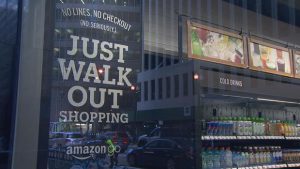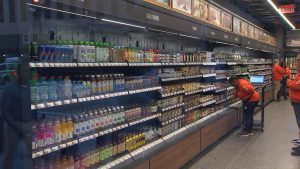Fourth Amazon Go store opens in Chicago
Amazon opened its fourth automated check-out store in Chicago. The store, about 1,950 square feet, is located at 111 E. Wacker Dr. at the Illinois Center and offers ready-to-eat meals, snacks and meal kits.
The opening came a little over four months after Amazon debuted its first concept store in Chicago, which was also its first outside Seattle where the company is headquartered.
Chicago’s first Amazon Go store debuted in September and is located at 113 S. Franklin St., about three blocks away from its second location at 144 S. Clark St., which opened in October. A third location opened at 500 W. Madison St. at the city’s Ogilvie Transportation Center in November.

The company’s first store opened in Seattle last year and was followed by two more in the same city after that. The stores sell things typically found at a convenience store – minus the cashiers, lines and registers.
Unlike most brick-and-mortar retail operations, shoppers enter by scanning the Amazon Go smartphone app at a turnstile. When they pull an item of the shelf, it’s added to their virtual cart. If the item is placed back on the shelf, it is removed from the virtual cart. Shoppers are charged when they leave the store.
The company says it uses computer vision, machine learning algorithms and sensors to figure out what people are grabbing off its store shelves. The store is not without employees — Amazon says there will be people there making food, stocking shelves and helping customers.

Amazon says families can shop together with just one phone scanning everyone in. Anything they grab from the shelf will also be added to the tab of the person who signed them in. But don’t help out strangers: Amazon warns that grabbing an item from the shelf for someone else means you’ll be charged for it.
The public openings in Chicago are another sign that Amazon’s efforts to expand its physical presence are rolling on.
Infacts, the company opened more than a dozen bookstores, taken over space in some Kohl’s department stores and bought Whole Foods in 2017, giving it 470 grocery stores.
Source: nbcchicago.com




